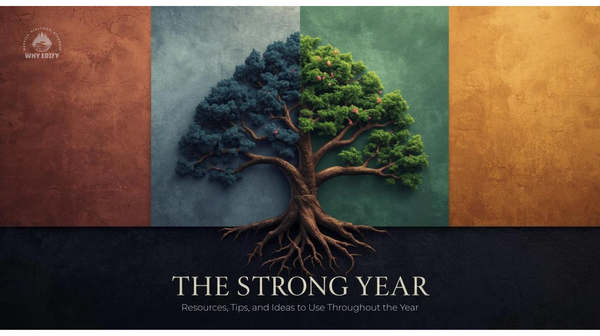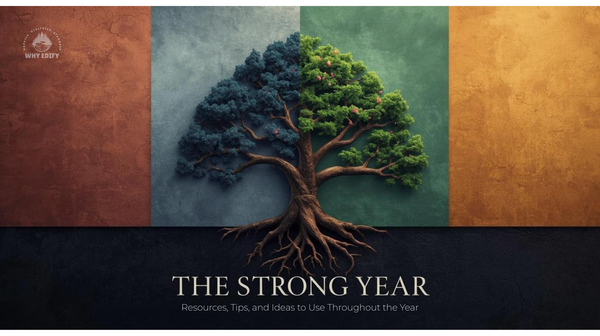Education, Not Apps: Refocusing on What Really Matters
Tech can support learning—but it’s not the point. Education is about people, purpose, and growth. Here’s why relationships still matter most.

I recently listened to an episode of The House of EdTech podcast (Episode 263) hosted by Chris Nesi, and it really got me thinking.
Chris took a break from talking about gadgets, apps, and AI tools to remind us what education is really about. His reflections touched on something I’ve been thinking about a lot lately: technology might shape the way we teach, but it should never define why we teach.
Education as the Great Equalizer
The episode began with a reminder that education is the great equalizer—a force that can change lives, open doors, and expand what’s possible for every learner. Chris mentioned Educated by Tara Westover, a powerful memoir about resilience and transformation through learning. It’s one of those books that reminds us how curiosity, connection, and courage can lift people out of even the hardest circumstances.
He emphasized that real learning begins with relationships—that education is about people, growth, and how learning shapes who we are. Technology, he said, is just a tool. Education provides the purpose.
Learning Starts With Connection
The best teaching moments I’ve ever had didn’t come from a fancy platform or a slick app. They came from a look of understanding, a question asked at just the right time, or a quiet conversation after class.
Chris shared practical reminders that we sometimes forget in the rush to keep up with the latest tech trends:
- Focus on relationships first — learning begins with trust.
- Make reflection part of the learning process.
- Model lifelong learning for students and peers.
- Use technology with intention, not obligation.
- Connect learning to the real world.
Simple ideas, but powerful ones.
Technology With Intention
A device alone doesn’t close a gap.
A caring teacher who helps students use that device well—that’s where the magic happens.
Tech can amplify good teaching, but it can’t replace it. It can extend access, but only if we pair it with digital literacy, human support, and strong relationships.
My Takeaways
Listening to this reminded me of how easy it is to get swept up in the latest app or tool. Teachers are constantly told that new tech will make everything easier, faster, and better—but sometimes it just makes things louder.
I don’t think students want more tools. I think they want more meaning.
As educators, our job isn’t to master every platform—it’s to choose a few tools that truly serve learning. That means slowing down long enough to ask:
“Does this tool help my students think more deeply, create more meaningfully, or connect more authentically?”
If the answer is no, it’s okay to leave it behind.
Balance the Digital With the Tangible
I also worry that kids are spending so much time on screens that they’re missing opportunities to develop collaboration, creativity, and communication in the real world.
That’s why I believe in balancing digital tools with what I like to call “different tech”—the simple, timeless tools that still work: pencils, notebooks, colored pencils, sticky notes, and markers.
There’s something powerful about putting pen to paper. It slows the mind down, deepens reflection, and makes learning tangible. Maybe these aren’t “old school” tools at all. Maybe they’re the most effective technology we’ve ever created.
Final Thought
Chris Nesi’s reminder was simple but necessary: education isn’t about technology—it’s about transformation.
Our mission isn’t to keep up with every new app; it’s to keep students curious, connected, and growing. If we can do that—through conversation, reflection, and intentional use of the right tools—then we’re doing the real work of education.
Let’s keep the main thing the main thing.
👉 Listen to the episode: House of EdTech Podcast #263
👉 Connect with The STRONG Teacher Lounge — a community where educators share ideas that put people, purpose, and presence first.
Strong Teacher Pep Talk Playlist
Explore the Teacher Reset Kit → My curated storefront with journals, books, and wellness gear that helps teachers recharge. (Purchases earn a small commission that keeps this newsletter free.)
Explore the Bonfire Shop → You’ll find shirts, mugs, and reminders to pause, renew, and stay strong.
Join the STRONG Teacher’s Lounge → A supportive space where educators share expertise, swap strategies, and learn from one another. Your voice matters here, and your presence helps strengthen our collective mission. Join Here!
Every purchase and every new member helps support the Why Edify Community. Thank you for being part of it!



